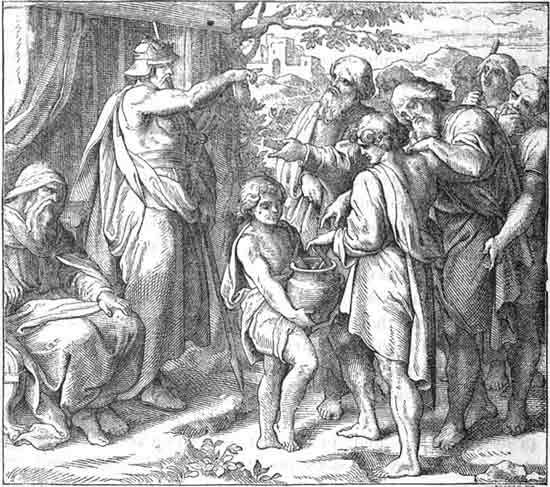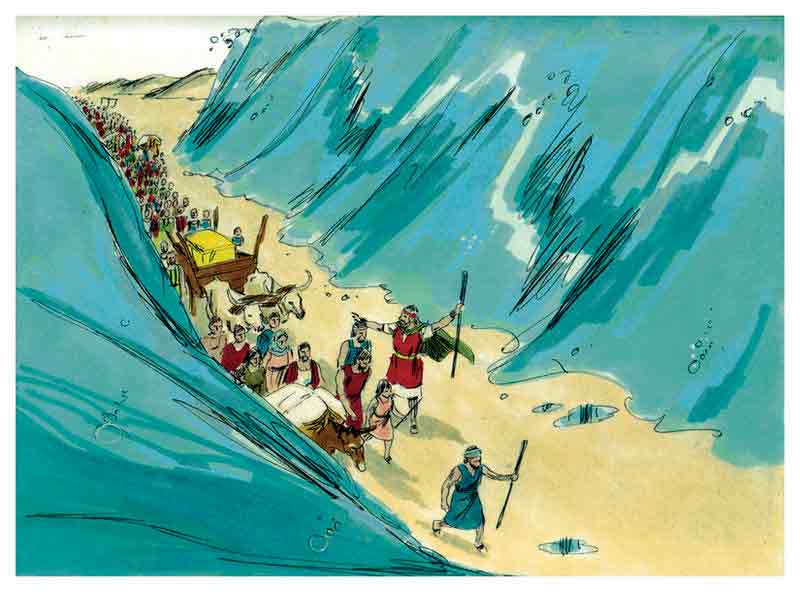For last many years the name Israel has been hitting the headlines on the international scene for one reason or the other. Israel’s policies and concomitant actions, though an object of consistent criticism, its policy could actually be termed as a ‘One Point Program’ which is, ‘We want the land that God promised to our patriarch Abraham, it is rightfully ours and we want it. This is all that we ask for’. This was it, the one purpose! The design of all the policies only had to fall in line. However, Israelis have spent a good 4 thousand years working towards this purpose.
4 thousand whole years….?
No mean period that! The history of the Jewish community, documented and generally known dates back 4 thousand years of which the significant events of the first 2 thousand years find a mention even in the ‘Bible’ (Old Testament), the most sacred text of the Christians.

4 thousand years is, by no standards a small period. A period this long generally sees a whole lot of vicissitudes and so it did. What remained unchanged, however were the commitment that the Jewish community felt for its homeland, their purpose, the zealous passion and resolute spirit meant to achieve this one purpose! A period of 4 thousand years is more than enough to infuse fundamental changes in a language. And so it is a point of wonder that ‘Hebrew’, the mother tongue of the Jews has undergone barely any change. We mean thereby that the Hebrew found on various inscriptions on stone and copper discovered during archaeological excavations is almost identical to the Hebrew spoken in Israel today. In fact the Israelis have nurtured it just like they have nurtured their aim – with all their hearts and at all costs.
And so to understand the country of Israel and the relentless perseverance of the Israelis it is very much in order to acquaint ourselves with their history.
This history begins around the period between the 20th to 18th centuries BC i.e. with ‘Abraham’, the patriarch of the Jews. Moreover may we mention the noteworthy fact that Abraham, whom the Jews revere as their patriarch is also accepted and venerated as a ‘prophet’ by two other monotheistic religions namely Islam and Christianity that also took birth in the Palestinian soil. It is for this reason that many scholars refer to these three religions as ‘Abrahamic religions’.

Coming back to the history, Abraham is believed to be a descendant of ‘Noah’. The concept of ‘Noah and his Ark’, saved from the ‘Deluge’ is widely known among almost all the prominent communities of the world, the names and the general details may differ though.
The following version of the story of Noah is what we may term a common belief among the Jews: ‘Sin overwhelmed the earth and so God decided to cause a Deluge that intended to drown only the sinners. Noah however, was very virtuous, righteous and ethical. Hence God decided to save him. God created a well-equipped Ark which his family and other virtuous people were allowed to board. Animals and birds representing their species were to accompany them. New creation that would follow the destruction of the world would be effected by means of these. God caused torrential rains over hundreds of days and the resultant Deluge drowned all existing creation. But Noah’s Ark was saved. Thus it was through these virtuous men that new creation, animals and birds came into being’.
And it is believed that it was in the family of this very Noah that Abraham took birth.
The main story of Abraham with more or less the same details finds mention in the sacred texts and scriptures of Judaism, Christianity and Islam. The Muslims and Jews are of the belief that the ancestry of Arabs originated from Abraham’s eldest son – Ishmael (Ismail). On the other hand the history of the Jews regards Abraham, his son Isaac (Yisḥaq) and Abraham’s grandson Jacob (Israel) as patriarchs and accords them therefore the central position in their religion.
The Hebrew Bible of the Jews (and also as per the ‘Old Testament’ of Christians) widely believes that –
Abraham was the chief of the herdsmen in the Sumerian city-state of ‘Ur’ in ancient Mesopotamia. The modern day Ur is a city in southern Iraq, situated in the delta where the river Euphrates meets the Persian Gulf. Archaeological excavations reveal that there was a ‘Ziggurat’ in Mesopotamian city-state of Ur. Abraham had a vision in which God appeared before him and commanded him to leave his house and settle in the land of Canaan.


Actually speaking this was the period when monotheism had given way to polytheism which was widespread. Various ethnicities worshipped deities as per their own notions of divinity. As a result there were multiple forms, traits and idols of Gods. In fact, Abraham’s father – Terah himself was a sculptor who made and sold such idols. But Abraham, who had been a thinker since childhood and so given to contemplations, firmly believed that ‘there was a power over and above all these deities that governed and controlled the world’. He stood so firm by this belief that he had to face the ire of not only the society but also the ruler of times. The ruler even went to the extent of throwing Abraham into the flames of a furnace, a punishment from which God saved him, so says a story.
Therefore despite circumstances being unfavourable, Abraham stuck to his belief that, that was Him, the One that he had seen in the vision, the One God, the true One that he believed to be beyond all that be, obeyed His Word and left Ur for Canaan with his father Terah, wife Sarah (original name Sarai), family and kindred. Though Abraham faced steep opposition from society over his concept of ‘One God’ being the Creator of the whole world’, there were also some who rallied around him, accepting his principles and beliefs and so joined him on his journey to Canaan.

On reaching Canaan God again appeared to Abraham in a vision and commanded him to bring together all those who believed in the principle of ‘One God’. God also promised him ‘The Land of Canaan’ – stretching from the River of Egypt to the river Euphrates (modern-day Israel and some of its neighbouring areas) and gave him the blessing that his descendants would create a great nation.
By this time Abraham had crossed the age of 75 and his wife Sarah was not too young either. Till then the couple had no issue. Although they were at a loss to know what they could do about it considering their ages, Abraham was sure that ‘God could do anything and that nothing was impossible for Him’ and he convinced his wife about it.
Thus in keeping with the command of God, Abraham and Sarah along with their family and supporters migrated to the land of Canaan and life began afresh. (To be continued…)


































